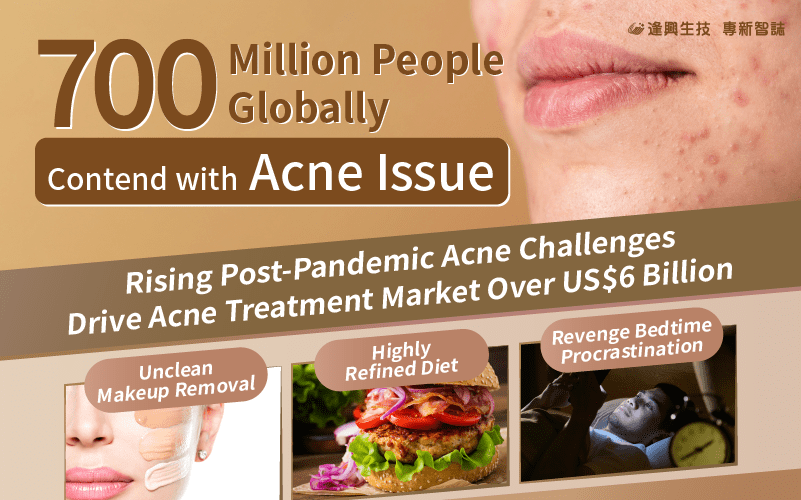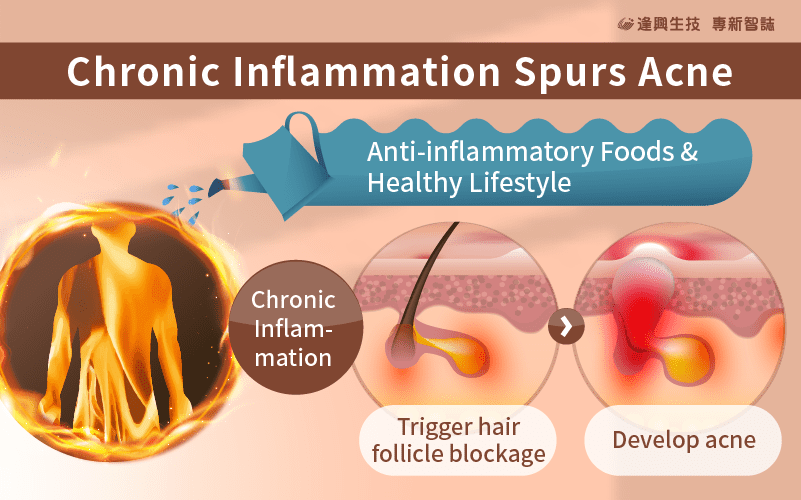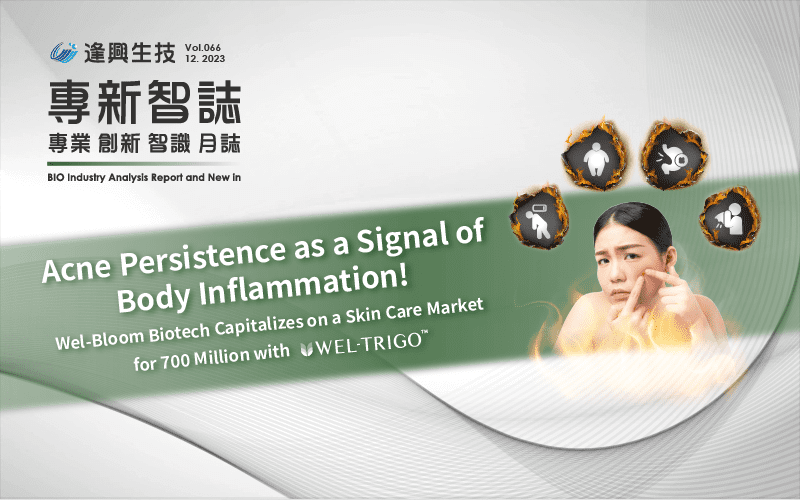Rising Post-Pandemic Acne Challenges Drive Skincare Market for Treatment Beyond US$6 Billion
Acne: A Worldwide Challenge
As people embrace a mask-free life in the post-pandemic era, the expectation of allowing their skin to breathe is met. Nevertheless, the increased frequency of makeup, dining out, and late-night socializing has rekindled facial skin issues. Raising attention to supplements for clear skin and anti-inflammatory skincare.
“Acne,” also known as acne vulgaris, often arises from an accumulation of excess sebum and dead skin cells, leading to clogged pores and chronic inflammation after infection by acne bacteria. Contrary to popular belief, acne is not confined to adolescence; adults may also experience “adult acne,” often attributed to an unhealthy lifestyle. According to a survey by a renowned American health education website, about 26% of women aged 31-40 suffer from adult acne, while the figure is 12% for women aged 41-50[1].
Surprisingly, an estimated 700 million people globally contend with acne, a chronic inflammatory skin condition, yet very few seek treatment, overlooking the severity of acne-prone skin[2].
The Negative Impact of Acne on Mental and Physical Health
When inflammation adversely affects the sebaceous glands and surrounding tissues, it can lead to pigmentation or scarring. In an era where appearance holds significance, acne scars wield an impact beyond physical aesthetics, influencing psychological well-being. A survey conducted by the “International Journal of Women’s Dermatology” revealed that 64% and 89% of women with moderate to severe acne experience feelings of low self-esteem and embarrassment, respectively[3]To address these concerns, many individuals turn to acne-covering cosmetics, propelling the growth of the related market projected to surpass US$6 billion by 2030[4]. However, makeup is only a temporary solution for this chronic inflammatory skin condition, and falls short of fulfilling the desire to improve acne-prone skin through more comprehensive acne treatment methods.

[1] At What Age Does Acne Go Away?- Apotheco Pharmacy Group
https://www.apothecopharmacy.com/blog/at-what-age-does-acne-go-away/
[2] What to Know About Body Acne- WebMD
https://www.webmd.com/skin-problems-and-treatments/acne/body-acne
[3] Anti-acne Cosmetics Market Size, Share & Trends Analysis Report By Product Type (Masks, Creams & Lotions), By Gender (Women, Men), By End Use (Dermatology Clinics, MedSpa), By Region, And Segment Forecasts, 2022 – 2030
https://www.grandviewresearch.com/industry-analysis/anti-acne-cosmetics-market
[4] Anti-Acne Cosmetics Market: New Trends, Applications, Key Factors, Type and Opportunities Analysis by 2032
https://www.taiwannews.com.tw/en/news/5032762
Chronic Inflammation Spurs Acne: Prioritize Anti-inflammatory Foods and a Healthy Lifestyle
Could Chronic Inflammation Sustain Acne Troubles?
Typical strategies involve consulting dermatologists and aesthetic medicine professionals. Patients need to adhere to prescribed treatments and refrain from self-dosing or discontinuation, which could lead to adverse effects. Considering the higher cost of aesthetic treatments, individuals are advised to opt for methods that align with their budget.
Yet, solely relying on external treatments falls short of addressing the core issue. Persistent acne, a chronic inflammatory skin condition, can be attributed to “internal heat” in traditional Chinese medicine. Research indicates a strong connection between acne development and inflammation[5], where lipid peroxides in sebaceous glands trigger pro-inflammatory cytokines, fostering the formation of folliculitis acne. Consequently, mitigating acne requires a focus on reducing inflammation.
- Rapid Weight Regain:
Swift weight loss via dieting results in the loss of water and muscle mass in the body. Consequently, the body triggers a protective mechanism, prompting the energy balance system in the brain to release hunger signals. This continuous feeling of hunger may compel individuals to eat more, exacerbating the situation.
Foods that Help Diminish Acne Inflammation
For effective acne treatment through anti-inflammatory skincare, prioritize lifestyle and dietary choices with natural antioxidants. Supplements for clear skin include anti-inflammatory foods rich in vitamins A, B, C, E, Omega-3 fatty acids, and zinc. To support these anti-inflammatory skincare methods, consider adding supplements for clear skin and hard-to-get nutrients as part of a holistic acne treatment approach.
Wel-Bloom Biotech focuses on addressing dual adult acne concerns—“reducing internal heat” and “skin whitening.” Formulated with a golden ratio of plant extracts, Wel-TriGo™ serves as a supplement for clear skin. Customizable to client preferences, it can be combined with other effective ingredients for desired effects, allowing for the effortless creation of distinctive beauty products.

[5] Tanghetti, E. A. (2013). The role of inflammation in the pathology of acne. The Journal of clinical and aesthetic dermatology, 6(9), 27.
https://www.ncbi.nlm.nih.gov/pmc/articles/PMC3780801/


